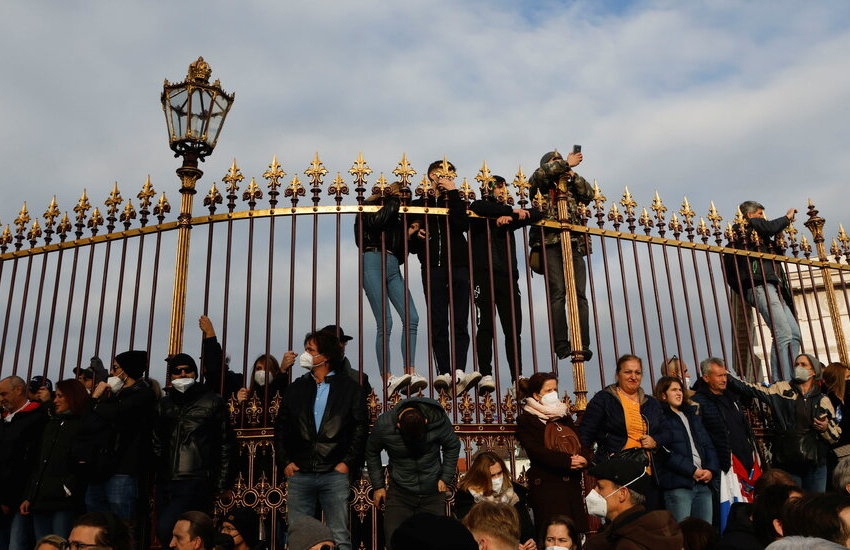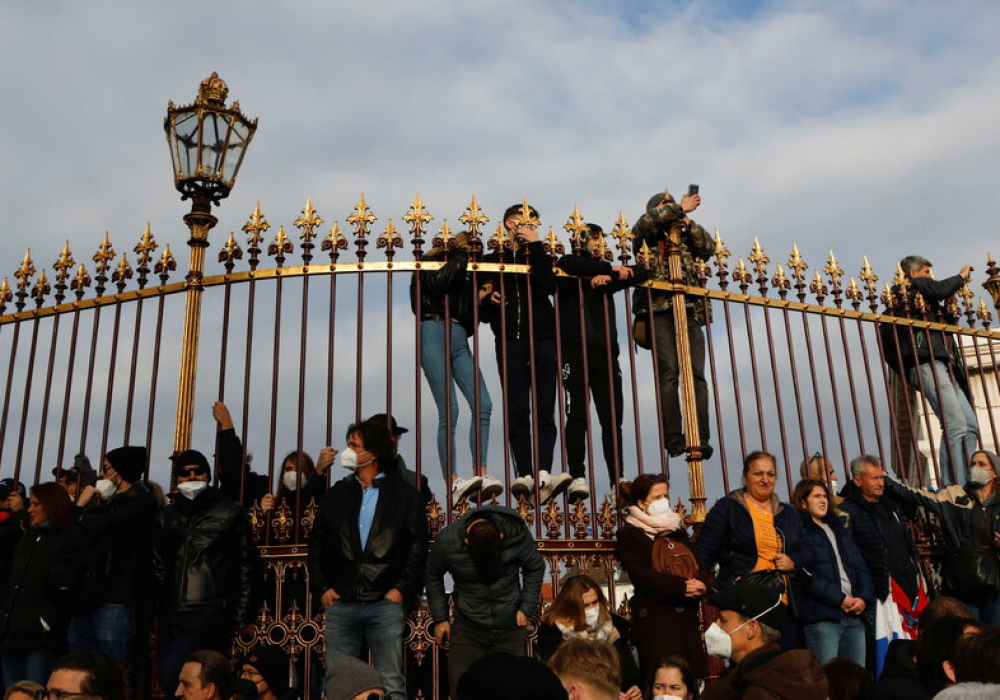VIENNA — Chanting “freedom” and “resistance,” thousands of Austrians marched through the heart of Vienna on Saturday, united in their anger at their government’s decision to impose a new lockdown and a sweeping nationwide vaccine mandate in an effort to squelch a fresh resurgence of the coronavirus.
The police in Vienna estimated that up to 40,000 people took part in the march, families and far-right groups alike. The protests were largely peaceful throughout the afternoon, but as dusk fell over the Austrian capital, skirmishes broke out between officers and groups of demonstrators.
The size of the turnout surprised officials and reflected the depth of opposition to the government’s efforts to crack down on those who continue to resist vaccination, nearly two years after the pandemic first reached Europe.
But with new infections multiplying among the unvaccinated in Europe, the president of Slovakia, Austria’s neighbor to the east, on Saturday became the latest to raise the prospect of mandating vaccines for all adults.
In Vienna, members of far-right groups and others threw beer cans at officers and set off pyrotechnics at points along the route, police officials said. At least five people were arrested, they said, and several others were written up for violations involving failure to wear masks, or for displaying stars like those the Nazis forced Jews to wear during the Holocaust.
At other points along the route, demonstrators banged on drums and rang cowbells to express their frustration at measures aimed at halting the rampant surge of the coronavirus, including a nationwide lockdown starting on Monday. Many of the protesters complained that their leaders had failed to do enough before imposing the drastic measures.
Among the protesters was Katja Schoissenger, a mother of two young children from Vienna, who carried a sign reading, “Freedom, Peace and Humanity.” She said she was angry about the limitations being imposed on the unvaccinated.
Since Monday, those who could not provide proof of vaccination or recent recovery from the coronavirus have been barred from public life, both indoor and out, with the police carrying out spot checks in restaurants and parks alike.
“Society is being massively divided and set against a group of people who are being shut out of public life and forced to do things we don’t want to do,” Ms. Schoissenger said. “I have nothing against people who want to be vaccinated. It is a free decision, and I think that’s OK and legitimate, but I am a young, healthy person and it’s not an issue for me.”
Nov. 20, 2021, 10:37 p.m. ET
More than one-third of the population in Austria is not vaccinated, one of the highest proportions in Europe. At the same time, the number of new infections has soared in recent weeks, and the 15,809 cases reported on Saturday set a record.
The number of unvaccinated people is straining Austria’s health system. Daily deaths have risen from an average in the single digits in late September to more than 40, according to the Our World in Data project at Oxford University.
The populist Freedom Party, which has vociferously opposed the government’s coronavirus restrictions over the past 18 months, helped organize Saturday’s protests, attracting far-right groups and conspiracy theorists from across the country and neighboring Germany.
The State of Vaccine Mandates in the U.S.
A growing number of employers, universities and businesses are now issuing some form of a vaccine requirement. Here’s a closer look.
“We are all Austrians, regardless of whether we are vaccinated or not vaccinated,” Udo Landbauer, a regional party leader, told the crowd at a rally on the Heldenplatz, a public space in Vienna. “We have rights, and we will continue to be loud until we get our basic rights back.”
Recent surveys show that vaccination is the most divisive issue right now in Austrian society and some observers fear the imposition of further restrictions may widen the gap.
“With the increasingly tense situation, I would expect that the conflict we already have will only get worse,” Julia Partheymüller, a political scientist at the University of Vienna, told the public broadcaster ORF.
As darkness fell on Saturday, conflicting scenes in the city reflected those divisions: Several dozen protesters gathered in front of the Chancellery for a torch-lit rally with speeches deploring the new measures. Across the way, residents sipped hot, mulled wine and ate candied nuts in anticipation of the Christmas season — one that will be limited now as the lockdown comes into effect on Monday.
Besmira Aleksi, a student of sociology at the University of Vienna, turned out to hold her own small protest — against the demonstrators who she said failed to understand how dangerous the virus is.
“Shame on you,” she yelled over the din of drums and a megaphone, as the police escorted a protester from the scene. She said that she had hoped to find a counterdemonstration, but when there was not one, she came out on her own.
“Nobody is trampling your rights,” Ms. Aleksi shouted to the crowd. “You are out here exercising them.”





